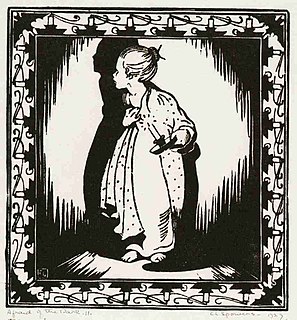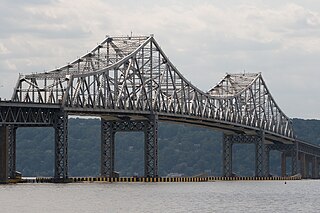Related Research Articles
In Greek mythology, Eiresione or Iresione was the personification of an object very important in many Greek rituals and ceremonies: a branch of olive or laurel, covered with wool, fruits, cakes and olive flasks, dedicated to Apollo and carried about by singing boys during the festivals of Pyanopsia and Thargelia, and afterwards hung up at the house door. It could only be carried by children who had two living parents. The song they were singing during the ritual was also known as "eiresione":
Eiresione for us brings figs and bread of the richest,
brings us honey in pots and oil to rub off from the body,
Strong wine too in a beaker, that one may go to bed mellow.
Aquaphobia is an irrational fear of water.

Panphobia, omniphobia, pantophobia, or panophobia is a vague and persistent dread of some unknown evil. Panphobia is not registered as a type of phobia in medical references.
Nepenthe is a fictional medicine for sorrow – a "drug of forgetfulness" mentioned in ancient Greek literature and Greek mythology, depicted as originating in Egypt.
Neophobia is the fear of anything new, especially a persistent and abnormal fear. In its milder form, it can manifest as the unwillingness to try new things or break from routine. In the context of children the term is generally used to indicate a tendency to reject unknown or novel foods. Food neophobia, as it may be referred to, is an important concern in pediatric psychology.
A Greek–English Lexicon, often referred to as Liddell & Scott or Liddell–Scott–Jones (LSJ), is a standard lexicographical work of the Ancient Greek language originally edited by Henry George Liddell, Robert Scott, Henry Stuart Jones, and Roderick McKenzie and published in 1843 by the Oxford University Press.
Osmophobia or olfactophobia refers to a fear, aversion, or psychological hypersensitivity to odors. The phobia generally occurs in chronic migraine sufferers who may have odor triggered migraines. Such migraines are most frequently triggered by foul odors, but the hypersensitivity may extend to all odors. One study found as many as 25% of migraine sufferers had some degree of osmophobia. The condition may also be present in individuals in substance withdrawal, specifically opioid withdrawal syndrome, where it is usually associated with nausea and/or vomiting.
Phonophobia, also called ligyrophobia or sonophobia, is a fear of or aversion to loud sounds —a type of specific phobia. It is a very rare phobia which is often the symptom of hyperacusis. Sonophobia can refer to the hypersensitivity of a patient to sound and can be part of the diagnosis of a migraine. Occasionally it is called acousticophobia.

Fear of the dark is a common fear or phobia among children and, to a varying degree, adults. A fear of the dark does not always concern darkness itself; it can also be a fear of possible or imagined dangers concealed by darkness. Some degree of fear of the dark is natural, especially as a phase of child development. Most observers report that fear of the dark seldom appears before the age of 2 years. When fear of the dark reaches a degree that is severe enough to be considered pathological, it is sometimes called scotophobia, or lygophobia.
Gerontophobia is the fear of age-related self-degeneration, or a hatred or fear of the elderly due to memento mori. The term comes from the Greek γέρων – gerōn, "old man" and φόβος – phobos, "fear". Gerontophobia has been linked to Thanatophobia as fear of old age can be a precursor to fear of death. Gerontophobia can be caused by harmful stereotypes of elderly people displayed in the media

Snapping one's fingers is the act of creating a snapping or clicking sound with one's fingers. Primarily this is done by building tension between the thumb and another finger and then moving the other finger forcefully downward, so it hits the palm of the same hand at a high speed.
Mysophobia, also known as verminophobia, germophobia, germaphobia, bacillophobia and bacteriophobia, is a pathological fear of contamination and germs. The term was coined by William A. Hammond in 1879 when describing a case of obsessive–compulsive disorder (OCD) exhibited in repeatedly washing one's hands. Mysophobia has long been related to compulsive hand washing. Names pertaining directly to the abnormal fear of dirt and filth include molysmophobia or molysomophobia, rhypophobia, and rupophobia, whereas the terms bacillophobia and bacteriophobia specifically refer to the fear of bacteria and microbes in general.

Taphophobia is an abnormal (psychopathological) fear of being buried alive as a result of being incorrectly pronounced dead.
Gynophobia or gynephobia is an abnormal fear of women, a type of specific social phobia. In the past, the Latin term horror feminae was used.
Gymnophobia is a fear (phobia) of nudity.

Gephyrophobia is the anxiety disorder or specific phobia characterized by the fear of bridges and tunnels. As a result, sufferers of gephyrophobia may avoid routes that will take them over bridges, or if they are a passenger, will act very apprehensively when passing over a bridge. The term gephyrophobia comes from the Greek γέφυρα (gephura), meaning "bridge", and φόβος (phobos), meaning "fear".

Fear of fish or ichthyophobia ranges from cultural phenomena such as fear of eating fish, fear of touching raw fish, or fear of dead fish, up to irrational fear. Selachophobia, or galeophobia, is the specific fear of sharks.
According to the DSM-IV classification of mental disorders, the injury phobia is a specific phobia of blood/injection/injury type. It is an abnormal, pathological fear of having an injury.
Scopophobia, scoptophobia, or ophthalmophobia is an anxiety disorder characterized by a morbid fear of being seen in public or stared at by others.
Ombrophobe or ombrophobous/ombrophobic plant is a plant that cannot withstand much rain. The term was introduced by the 19th-century botanist Julius Wiesner, who identified the two extreme kinds of plants, ombrophobes and ombrophiles. Xerophytes are usually ombrophobous.
References
- ↑ Semple, David; Roger Smyth; Jonathan Burns; Rajan Darjee; Andrew McIntosh (2005). Oxford handbook of psychiatry. Oxford University Press. ISBN 978-0-19-852783-1.
- ↑ Glenn, Harrold. "The Ultimate Self-Hypnosis Cure for the Phobia of Hospitals (Nosocomephobia)". Diviniti Publishing Ltd. Retrieved 29 November 2009.
- ↑ "Nosocomephobia". The Personal Genome. Archived from the original on 5 October 2018. Retrieved 29 November 2009.
- ↑ Kirchheimer, Sid. "How to Survive a Stay in the Hospital". Web MD. medicinenet.com. Retrieved 29 November 2009.
- ↑ "Nixon Rejecting Care in Hospital". UPI. Spokane Daily Chronicle. 16 September 1974. Archived from the original on 1 October 2015. Retrieved 28 November 2009.
- ↑ "Doctor Tells Nixon's Fear of Hospital". Associated Press (AP). Toledo Blade. September 15, 1974. Retrieved 28 November 2009.[ dead link ]
- ↑ νοσοκομεῖον, Henry George Liddell, Robert Scott, A Greek-English Lexicon, on Perseus
- ↑ φόβος, Henry George Liddell, Robert Scott, A Greek-English Lexicon, on Perseus
- ↑ Thomas, Charles (2001). The words of medicine: sources, meanings, and delights. University of Michigan: Charles C. Thomas. ISBN 0-398-07132-2.